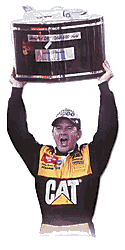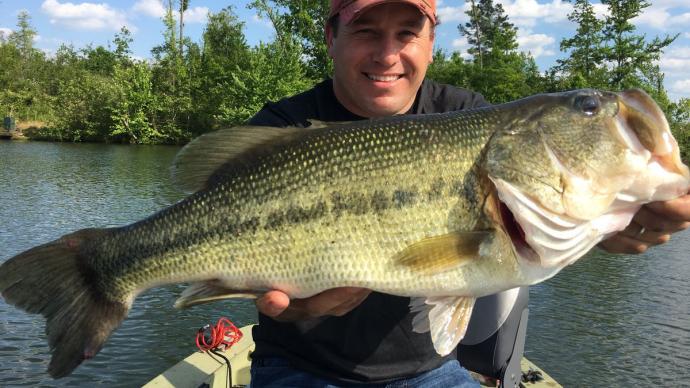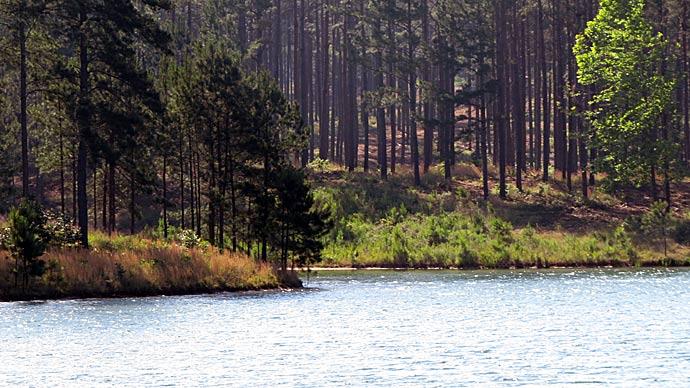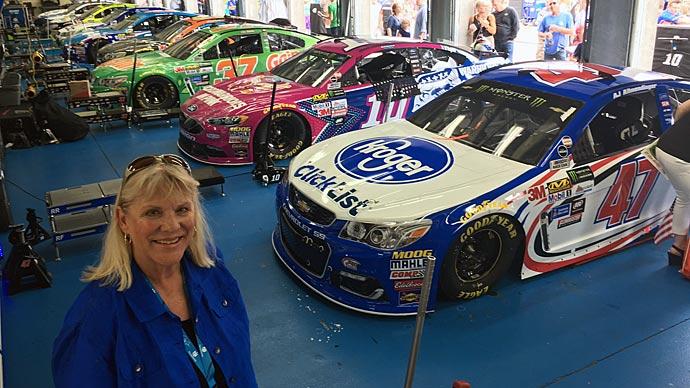
For 36 grueling weekends a year, Ward Burton straps himself into his No. 22 Caterpillar car and steps on the gas. He dodges bullets like fiery multicar crashes, crowded pit lanes, blown engines and the ever-present track debris in an attempt to bully his way past 42 other competitors to that elusive Victory Lane.
Winners are crowned at 23 different tracks every season, but ask any NASCAR driver which race they'd most like to win, and most would choose the Daytona 500. The 2002 Daytona 500 looked worse than a violent video game, with shot after shot of mangled sheet metal and twisted fenders. A fiery accident on lap 146 took 18 cars out of contention, but Burton sidestepped that melee and raced his way to the Holy Grail of motorsports: a Daytona 500 victory. With the win, Burton's name is now listed alongside such storied drivers as Earnhardt, Petty and Jarrett in the annals of NASCAR history.
Burton's life is a case study in the extreme. By day he's hurling himself toward concrete walls at 200 mph, but away from the track, Burton prefers life in the slow lane. Off the track, his superspeedway is his 2,000-acre wildlife preserve, his pit road perhaps a newly discovered trail in the woods and his Victory Lane, a brand-new 10-acre lake. His sanctioning body? On the track, it's NASCAR. Off the track, it's the Ward Burton Wildlife Foundation, and if there were justice in this world, the name Ward Burton would be as synonymous with conservation as Dale Earnhardt is with racing.
In 1996, Burton turned his grandfather's legacy into something tangible with the Ward Burton Wildlife Foundation. The term "outdoor enthusiast" doesn't begin to adequately describe Burton, who inherited his love of the outdoors from his grandfather.
"The relationship I had with my grandfather, in particular, taught me at an early age that (conservation) is an important pastime," Burton said. "I feel it is my inherited responsibility to give and not just take.
"I just want to influence the next generation and hopefully some of the existing generations about the importance of conservation."
At the center of Burton's efforts is a 1,123-acre piece of land in Halifax County, Va., that makes a horseshoe around the 2,000-acre spread Burton has protected for some time. Working in tandem with other conservation agencies, the Ward Burton Wildlife Foundation must raise $1.5 million by Dec. 31 in order to preserve the land.
"The 2,000 acres we have now are very diversified," Burton said. "The importance of getting this other part is because it would help us with the wildlife management that we're already practicing on our other 2,000 acres."
With the land, Burton would construct an educational facility to teach the public about the importance of conservation.
"We want to give them some great experiences in the outdoors as well as teach them about the history of conservation - where we've gone and where our successes and where our failures have been - and hopefully they'll carry the message on to other folks," Burton said.
Burton admits he is struggling with raising the kind of capital it takes to make his dream a reality. He has teamed up with Virginia conservation agencies as well as Return to Nature, a group that takes the conservation message to students in their schools, to help him reach his goals.
His NASCAR sponsors have anted up to help him as well. Current sponsor Caterpillar has helped get the original 2,000 acres back in shape. Caterpillar has also been instrumental with the 10-acre lake recently developed on the property. "We have almost completed a dam and are putting in a lot of stumps, trees, tires, and all kinds of concrete pipes for structure and habitat," Burton said.
Burton bought the original 2,000 acres from a couple of different property owners, one of which was a 100-year-old man named C. H. Watts.
"He had lived on that land all of his life, and he was a preacher," Burton said. "He saw what we were trying to do and saw me working on the land for about a decade, and he convinced his family to let us have the first shot at receiving his farm after his passing. All seven of his children were for it 100 percent. We're making sure that we manage that piece of property like he would have liked us to."
An education in conservation
After college, when most kids are furnishing new apartments and starting new lives, Burton, who attended Elon University, found himself back in the place he loved most - a little cabin in the woods.
"When I got out of college, I didn't really have a direction in life, so I went out to a little cabin and stayed there for about two years," he said. "I didn't have any family at that time, so I didn't really have any responsibility other than to keep myself fed."
Burton's solo excursion changed his life. "I learned a great deal not only about wildlife but about myself," he said. "I just really had a ball. It was a very special piece of my life.
"When I was a kid, I always felt really comfortable in the outdoors and was fascinated by wildlife, and the only way to learn about wildlife is to be in the outdoors. It's just something I've always not only enjoyed but have also been really enthused about, and I feel really comfortable and at ease in the outdoors by myself."
Sharing a home with a smorgasbord of species produced a variety of memorable moments for Burton, most notably a run-in with a trapped skunk.
"One time I had a skunk in a snare, and I didn't want to kill the skunk, so I took my shirt off and wrapped it around his head and tried to get it around his tail to release the skunk from the snare," Burton said. "I got the skunk out of the snare, but he also got me a little bit, so I smelled a little bit like a skunk for a week or so. Anytime I smell a skunk now, it smells good to me!"
Burton's other pastimes are naturally outdoor-related. His elk hunting forays have taken him to British Columbia and New Mexico twice, and he plans to visit Utah this fall.
"I've never bagged an elk, but every time I leave there I just feel like I'm leaving a piece of me in those mountains," he said. "I'm learning so much about new types of wildlife which I wasn't exposed to as a youngster but that I read so much about as a kid. I'm probably more of a hiker with a gun on my back than I am a shooter."
Family tradition
Burton is passing along his wildlife heritage to his children in the same way his grandfather handed down his own legacy.
His oldest daughter, 15-year-old Sarah, loves to ride horseback but doesn't yet share her father's unbridled passion for the outdoors. "I can't get her quite as enthused as I am," Burton said. "I told Sarah that she's got to take on the duck swamp with me this coming season. I'm going to drag her out of bed early one morning, and she's going to stay in the woods with me all day."
Nine-year-old Jeb, however, is falling straight into his father's footsteps. "He's into it big-time," Burton said. "We actually had a corn snake in a little habitat, and we watched him shed his skin. He's been outdoors with me a lot. Where we live, we see turkeys, deer and rabbits every day. This past year he killed his first wild turkey. That was a very special time to me. He was very excited; you ought to see the picture and how his eyes were going with that little turkey!"
If Jeb ever loses interest, though, there's still 9-month-old Ashton. "Once he gets to be Jeb's age, I will have finished my racing career, so I'll have a bunch of time to spend with him," Burton said. "He'll end up being die-hard, I'm sure."
Meeting a hero
These days, Burton has more than his racing, his foundation, and his children to focus on. He, along with 2000 Winston Cup Champion Bobby Labonte, was recently named spokesman for a new NASCAR/Ranger Boats partnership. The association provided Burton the opportunity to meet one of his heroes, Ranger Boats founder Forrest L. Wood.
"Not only have they got the best boat in the industry, and I'm excited about being able to use some of their products, but I'll tell you what, one thing that was equally exciting to me was to get to meet Forrest Wood and learn a little bit about him and his outdoor efforts," Burton said. "He's a gentleman who is wise beyond his years, and I'm really looking forward to becoming closer to him because his interests and mine are just hand-to-hand. I'm really excited about working with his company and helping them promote Ranger Boats."
For that reason, Burton hopes to enlist Wood's help with his new 10-acre lake. "I know he's been very instrumental in the past at helping fisheries," Burton said.
An avid fisherman, Burton hasn't been able to spend time on the water lately like he used to with his father and grandfather. "This is going to be a good excuse to start fishing more once I get one of the boats," Burton said.
Preferably, Burton would like to be in one of Ranger's new NASCAR-style boats. "Those babies are bad to the bone," he said. "Those are some very, very good-looking boats."
The defining moment
Like any good fisherman, Burton can tell some tales, and, naturally, most involve his grandfather. "When I was a little kid, my granddad used to use those long, 16-foot cane poles to catch crappie," he said. "Being the little rugrat and hard-headed little kid that I was and still am, I used to always get it tangled up. He wasn't too happy with me when I'd mess up his crappie fishing!"
Just a few years ago, Burton realized that the wildlife and conservation philosophies of his grandfather had been passed on to him for a reason. "I realized it was up to me, and it was my responsibility to get this message out," Burton said. "That's why we formed the wildlife foundation. That's why I work every day on it.
"He spent a lot of time with me when I was a little boy, and I was fortunate to be at the age to take advantage of it. He passed away many years ago, but he walked on water to me."
Despite his love of the outdoors, Burton's time is mostly spent on the track, and, for now, the defining moment of his career was when his car was the first one to cross the finish line at the Daytona 500.
"There are so many things about racing you can't control," Burton said. "Daytona is one of those places where you can pick one line and be going forward one lap and then be going backward the next."
The 2001 Daytona 500 is remembered as the race that claimed the life of racing icon Dale Earnhardt. The 2002 Daytona 500 is thankfully remembered for a much lighter subject. After a late-race accident, NASCAR officials red-flagged the race in order to ensure a green-flag finish. As the cars sat parked on the speedway, frontrunner Sterling Marlin unexpectedly and illegally got out of his race car to yank on his fender. The incident quickly became NASCAR lore, and NASCAR black-flagged Marlin, sending him to the back of the pack, thus setting the stage for Burton's greatest victory.
"When the 40 car (of Sterling Marlin) went to the rear, I had to hit all the gears right," Burton said. "I thought we had a good shot at it, and then here comes a fellow Virginian, Elliot Sadler, behind me. He had a run on me, but he couldn't do anything with me. We kind of just rode there and stayed in line. It was a great feeling. I had to take an extra lap to get my emotions together."
Of Marlin's infamous episode, Burton said: "He really didn't have anything to lose. He took a chance to get it off himself, and to be honest with you, it was probably the move of the race."
In the last decade, NASCAR has become a sponsor-driven sport experiencing explosive growth. Professional bass fishing seems to parallel this, with the advent of sponsor boats and teams and the increase in popularity. Burton, a veteran of such a sport, offered some advice to his bass-fishing counterparts.
"Tell them they'd better watch out, because after I get this Ranger boat and I start learning how to catch bass, that might be my next career!"
How to donate
The Ward Burton Wildlife Foundation must raise $1.5 million by Dec. 31, 2002, in order to preserve its mission and focus by acquiring 1,123 acres of land that adjoins 2,000 acres Ward Burton has personally protected for years. You can help. A $25 regular membership gets you a decal and a cap. Those who donate $100 receive Silver Benefactor Membership along with a decal, cap, limited-edition die-cast car and an autographed picture. Donating $1,000 makes you a Gold Benefactor member, and you will receive a decal, cap, die-cast and autographed picture along with a t-shirt, plaque and personal phone call from Burton himself. Diamond Benefactors donate $10,000 and receive all of the above. Corporations can donate $10,000 and beyond to receive Corporate Benefactor Membership and all of the previously mentioned amenities. The Ward Burton Foundation is a non-profit organization.
Content provided by Bass Fishing Magazine, the official publication of FLW Outdoors



